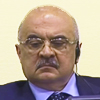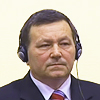| Press Release |
CHAMBERS
|
| (Exclusively for the use of the media. Not an official document) |
|
The Hague, 15 April 2011
NJ/MOW/PR1402e
Tribunal Convicts Gotovina and Markač, Acquits Čermak
 Ante Gotovina |
 Ivan Čermak |
 Mladen Markač |
Trial Chamber I of the International Criminal Tribunal for the former Yugoslavia (ICTY) today convicted two Croatian Generals, Ante Gotovina and Mladen Markač, and acquitted one, Ivan Čermak, of charges of crimes against humanity and violations of the laws or customs of war committed by the Croatian forces during the Operation Storm military campaign between July and September 1995.
Gotovina, who held the rank of Colonel General in the Croatian army and was the Commander of the Split Military district during the indictment period, and Markač who held the position of Assistant Minister of Interior in charge of Special Police matters, were convicted of persecution, deportation, plunder, wanton destruction, two counts of murder, inhumane acts and cruel treatment. They were sentenced to 24 and 18 years’ imprisonment respectively. They were acquitted of charges of inhumane acts / forcible transfer. Čermak, who was the Commander of the Knin Garrison, was acquitted of all charges.
The Chamber found that the crimes took part during an international armed conflict in Croatia and in the context of many years of tensions between Serbs and Croats in the Krajina region where previously a number of crimes had been committed against the Croats.
“However, this case was not about crimes happening before the indictment period. Nor was it about the lawfulness of resorting to and conducting war as such,” Judge Alphonsus Orie, presiding said. “This case was about whether Serb civilians in the Krajina were the targets of crimes and whether the Accused should be held criminally liable for these crimes.”
The Chamber found that the Croatian military forces and the Special Police committed a high number of crimes against the Serb population during Operation Storm.
These crimes were committed as part of a joint criminal enterprise whose objective was permanent removal of the Serb population from the Krajina region by force or threat of force, which amounted to and involved deportation, forcible transfer, and persecution through the imposition of restrictive and discriminatory measures, unlawful attacks against civilians and civilian objects, deportation, and forcible transfer. The Chamber found that the joint criminal enterprise came into force no later than the end of July 1995 in Brioni where the Croatian President Franjo Tuđman met with high ranking military officials to discuss the military operation which commenced a few days later on 4 August.
The Chamber found that Tuđman was a key member of the joint criminal enterprise and that he intended to repopulate the Krajina with Croats. Other members of the joint criminal enterprise included Gojko Šušak, who was the Minister of Defence and a close associate of Tuđman’s, Zvonimir Červenko, the Chief of the Croatian army Main Staff. The members of the joint criminal enterprise also included others in the Croatian political and military leadership who participated in Presidential meetings and were close associates of Tuđman’s.
The Chamber found that Gotovina participated in the Brioni meeting and contributed to the planning and preparation of Operation Storm. Gotovina’s conduct, including his order to unlawfully attack civilians and civilian objects through the shelling of Benkovac, Knin and Obrovac on 4 and 5 August 1995, amounted to a significant contribution to the joint criminal enterprise. The Chamber further found that other charged crimes, although not part of the common purpose, were natural and forseeable consequences of the execution of the joint criminal enterprise, including to Gotovina.
Markač also participated in the Brioni meeting, contributing to the planning and preparation of Operation Storm. During Operation Storm and subsequent search operations approximately 2,200 Special Policemen were subordinated to the Croatian army Main Staff. Markač ordered the Special Police’s shelling of Gračac on 4 and 5 August 1995, which constituted an unlawful attack on civilians and civilian objects and brought about the forcible displacement of persons thus making a significant contribution to the joint criminal enterprise.
The Chamber found that the Special Police also participated in the destruction and looting of Krajina Serb property in Donji Lapac on 7 and 8 August 1995. In addition, on 25 August 1995, members of the Special Police murdered several elderly villagers in the hamlet of Grubori. On that and the following day, the same unit also burned property in Grubori and in Ramljane village.
“Markač advanced false stories and participated in the cover up of crimes committed by his subordinates against Krajina Serb persons and property,” Judge Orie said. The Chamber found that Markač knew about the involvement of his subordinates in the commission of these crimes, but that he did not take any step to identify the perpetrators in order to take appropriate action against them, nor did he take any step to prevent the commission of further crimes.
The Chamber has concluded that, through his acts and omissions, Markač created a climate of impunity amongst his subordinates which encouraged the commission of crimes against Krajina Serb persons and property.
With regard to Ivan Čermak, the Chamber found that he did not have effective control over Croatian army units outside of his own subordinates at the garrison, and the Chamber found no reliable evidence that those subordinates committed any crimes. Furthermore, evidence presented did not establish that Čermak was a member of the joint criminal enterprise or that he intentionally or significantly contributed to it.
In respect of the crimes committed on the ground, the Chamber found that Čermak denied and concealed the crimes committed in Grubori on 25 August 1995. However, the Prosecution did not prove its allegations that Čermak permitted, minimised, denied or concealed crimes against Serbs, nor that he provided false, incomplete or misleading information or false assurances to the international community.
The Chamber ordered that Čermak be released as soon as possible. Gotovina is entitled to credit for the 1956 days that he has been custody and Markač to 1477 days. Both the Prosecution and the defence have the right of appeal.
The trial commenced on 11 March 2008 and lasted a total of 303 days during which 4,819 exhibits were admitted. The Trial Chamber heard the testimony of a total of 145 witnesses of which 81 witnesses were called by the Prosecution, 57 by the Defence and seven by the Trial Chamber itself.
Since its establishment, the Tribunal has indicted 161 persons for serious violations of humanitarian law committed on the territory of the former Yugoslavia between 1991 and 2001. Proceedings against 125 have been concluded. Proceedings are currently ongoing for 34 accused.
*****
Judgement Summary
Judgement: Volume 1 | Volume 2
Case information sheet
Courtroom proceedings can be followed on the Tribunal’s website at www.icty.org
*****
International Criminal Tribunal for the former Yugoslavia
For more information, please contact our Media Office in The Hague
Tel.: +31-70-512-8752; 512-5343; 512-5356 Fax: +31-70-512-5355 - Email: press [at] icty.org
Follow ICTY on Twitter and Youtube

